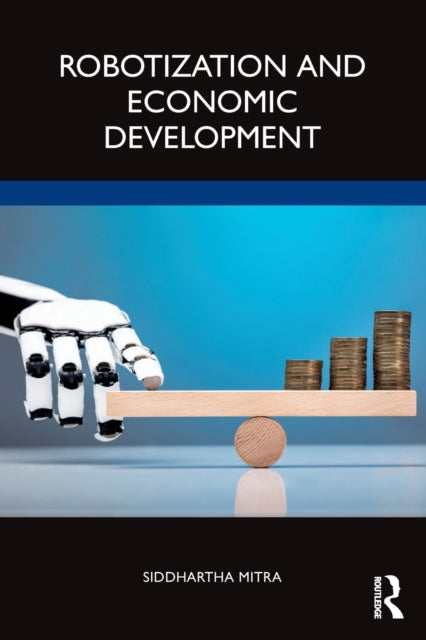SiddharthaMitra
Robotization and Economic Development
Robotization and Economic Development
YOU SAVE £2.07
- Condition: Brand new
- UK Delivery times: Usually arrives within 2 - 3 working days
- UK Shipping: Fee starts at £2.39. Subject to product weight & dimension
Bulk ordering. Want 15 or more copies? Get a personalised quote and bigger discounts. Learn more about bulk orders.
Couldn't load pickup availability
- More about Robotization and Economic Development
This book examines the impacts of robotization and artificial intelligence on employment, per capita income, quality of life, poverty, and inequality in developing and developed economies. It analyzes the direct and indirect effects on labor markets and production processes and compares human labor with robotic labor. It provides insights into the effectiveness, benefits, and negative implications of robotization for policymakers and others interested in these areas.
Format: Paperback / softback
Length: 150 pages
Publication date: 09 September 2022
Publisher: Taylor & Francis Ltd
This comprehensive book delves into the profound impacts of automation and artificial intelligence on employment, per capita income, quality of life, poverty, and inequality across developing and developed economies. It conducts a rigorous analysis of the direct and indirect effects these technologies have had and are projected to have on various industries, including manufacturing, healthcare, and agriculture. The author explores the evolving dynamics between human labor and robotic labor, emphasizing the transformative changes that new technologies will bring to traditionally labor-intensive sectors. By offering a wealth of insights into the effectiveness, benefits, and potential drawbacks of robotization, the book provides policymakers with a comprehensive framework for implementing reforms that embrace new technologies while addressing employment needs and achieving development goals.
The book is organized into several chapters, each dedicated to exploring different aspects of the robotization and AI phenomenon. The first chapter provides an overview of the historical context and trends in automation and AI, highlighting their potential to drive economic growth and innovation. The second chapter examines the direct effects of robotization and AI on employment, exploring how they have led to job displacement, skill requirements changes, and wage inequality. The third chapter explores the indirect effects of these technologies on productivity, income distribution, and social welfare.
In the fourth chapter, the author compares human labor with robotic labor, emphasizing the differences and similarities between the two. They discuss the potential benefits of automation, such as increased efficiency, improved quality, and reduced costs, as well as the challenges posed by job displacement and the need for retraining and upskilling. The fifth chapter examines the role of government policies and regulations in shaping the impact of robotization and AI on employment and inequality. The author suggests that policymakers should prioritize policies that promote job creation, skill development, and social protection for vulnerable groups.
The final chapter provides a conclusion that summarizes the key findings of the book and offers recommendations for policymakers and other stakeholders. The book is written in a clear and accessible style, making it suitable for scholars and researchers in a wide range of disciplines, including science and technology studies, digital humanities, economics, labor studies, public policy, development studies, political studies, and sociology. It will also be valuable for policymakers and others who are interested in understanding the implications of automation and AI on economic and social development.
In conclusion, this book is a valuable resource for anyone seeking to understand the complex and multifaceted impacts of robotization and artificial intelligence on employment, per capita income, quality of life, poverty, and inequality. By providing a comprehensive analysis of the direct and indirect effects of these technologies, the author offers insightful recommendations for policymakers and other stakeholders to navigate the challenges and opportunities posed by these transformative technologies.
Weight: 258g
Dimension: 155 x 233 x 12 (mm)
ISBN-13: 9780367356095
This item can be found in:
UK and International shipping information
UK and International shipping information
UK Delivery and returns information:
- Delivery within 2 - 3 days when ordering in the UK.
- Shipping fee for UK customers from £2.39. Fully tracked shipping service available.
- Returns policy: Return within 30 days of receipt for full refund.
International deliveries:
Shulph Ink now ships to Australia, Belgium, Canada, France, Germany, Ireland, Italy, India, Luxembourg Saudi Arabia, Singapore, Spain, Netherlands, New Zealand, United Arab Emirates, United States of America.
- Delivery times: within 5 - 10 days for international orders.
- Shipping fee: charges vary for overseas orders. Only tracked services are available for most international orders. Some countries have untracked shipping options.
- Customs charges: If ordering to addresses outside the United Kingdom, you may or may not incur additional customs and duties fees during local delivery.


